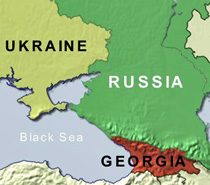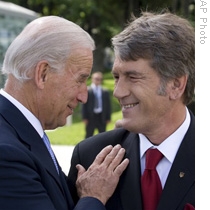Washington
04 September 2009
 |
Since the collapse of the Soviet Union in 1991, 12 countries from eastern and central Europe have become NATO members, almost doubling the alliance's number of countries from 15 to 28. [The 12 are Albania, Bulgaria, Croatia, the Czech Republic, Estonia, Hungary, Latvia, Lithuania, Poland, Romania, Slovakia and Slovenia.]
Two other former Soviet Republics - Georgia and Ukraine - have expressed interest in becoming NATO members. The Bush administration strongly supported their membership bids. But at the April 2008 NATO summit in Bucharest, Romania, member countries declined requests by both countries to begin the process of accession known as a "Membership Action Plan." The final summit communiqué simply said NATO leaders agreed "these countries will become members of NATO" - but no time frame was given.
Many experts, including David Marples with the University of Alberta, say essentially two countries led the charge to postpone Georgian and Ukrainian NATO membership.
"There was clearly opposition from France and Germany to fast-track membership for Ukraine and Georgia," he said. "And those two countries are really more intent on maintaining good relations with Russia."
Russia's stance
Moscow has always been strongly opposed to NATO's eastward expansion. James Sherr, with the London-based research organization Chatham House, says there are two reasons for Russia's position, especially when it comes to Ukraine's NATO membership bid.
"Ukraine, for Russia, is not just a neighbor. Ukraine, for Russia, is part of Russia's own identity," he said. "Kiyev and Rus is the origin of the Russian as well as the Ukrainian state - that's the way Russians see it. So any movement by NATO into Ukraine is seen, at least emotionally, as a direct encroachment on Russia itself."
"And the second issue is that behind NATO they [the Russians] see the United States and U.S. power and they remain as convinced as in the past that it is in the U.S. national interest to weaken Russia as an authentically independent countervailing pole in the international system," he added.
 |
| Ukrainian President Viktor Yushchenko (r) and US Vice President Joe Biden speak in Kiyev, Ukraine, 21 Jul 2009 |
"The United States supports Ukraine's sovereignty, independence and freedom, and to make its own choices - its own choices - including what alliances they choose to belong," he said.
Biden made that same point during a trip to Georgia. Neither statement pleased Russian officials.
Chances of becoming members
David Kramer, former senior State Department official in the Bush administration, says both countries have to overcome numerous obstacles before becoming NATO members.
"Joining NATO means meeting the criteria for joining NATO - countries can't simply fill out an application and become a member the next day," he said. "They do have to undertake reforms that include political, economic as well as security reforms. And membership is a long process - it doesn't happen quickly."
"And so in some respects, in different areas, Georgia and Ukraine have made progress in these regards. But in other areas in other parts of reform, they have a long way to go. So membership for Ukraine and Georgia is not going to be in the offing anytime soon," he continued.
Ronald Suny, with the University of Chicago, sees other reasons why Georgia's and Ukraine's NATO membership bids are on the very, very distant back burner.
"Europe is very wary about this," he said. "The United States rhetorically still supports it, but no-one is pushing for it. And it would be extraordinarily difficult to bring Georgia and Ukraine into NATO. These are countries which are not stable politically."
"The Georgians, particularly, need serious military reforms before they'll come up to NATO standards. And I think that since most Ukrainians are not, or a heavy percentage of Ukrainians are not in favor of it, that puts a damper on that side. And on the other side, Georgia is not a unified country, large parts of it now are occupied by the Russians who claim that these parts are independent states [Abkhazia and South Ossetia] - so I would say that this is not on the agenda," he added.
Experts say the debate has now shifted from a fast track approach for Georgia's and Ukraine's NATO membership - the "Membership Action Plan" concept - to "eventually" becoming a member of the Western alliance. But as several analysts have stressed - "eventually" can be a very long time.